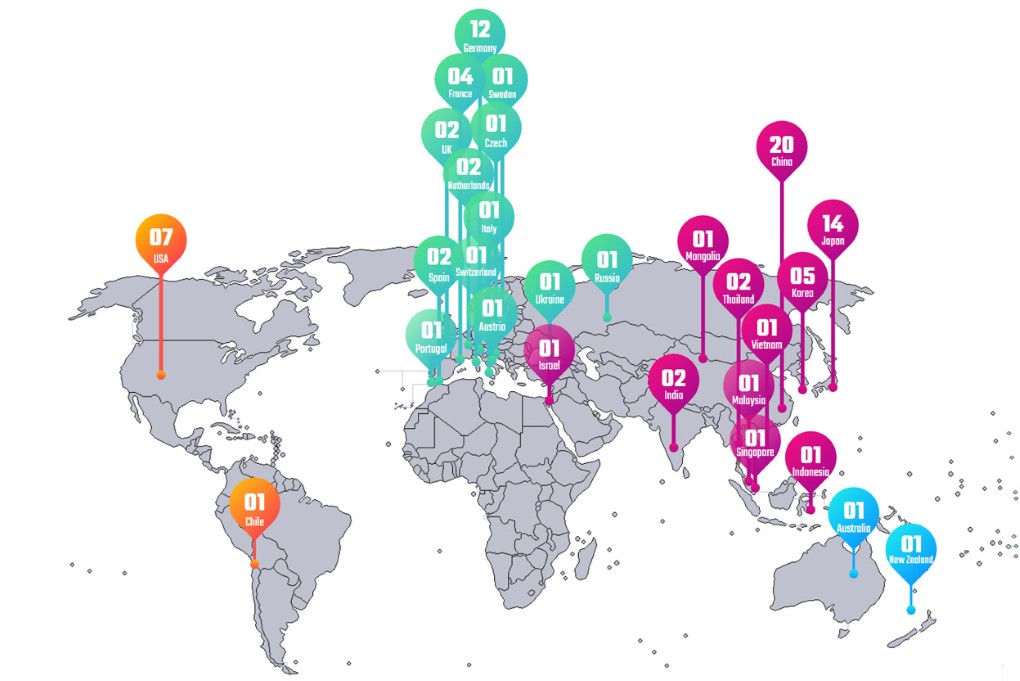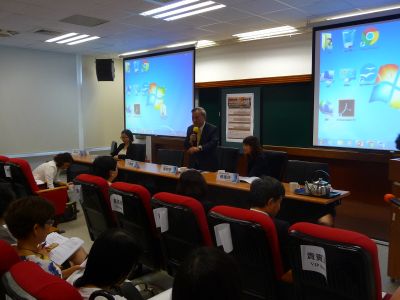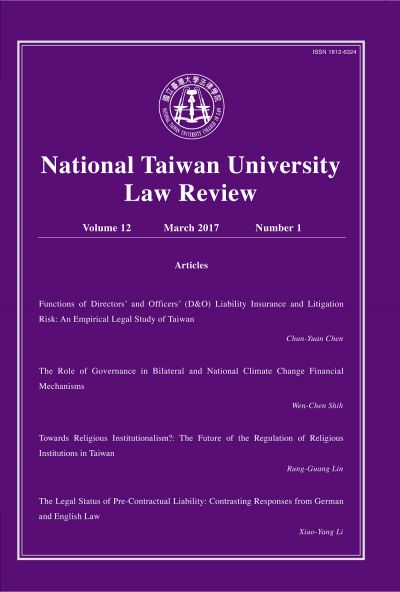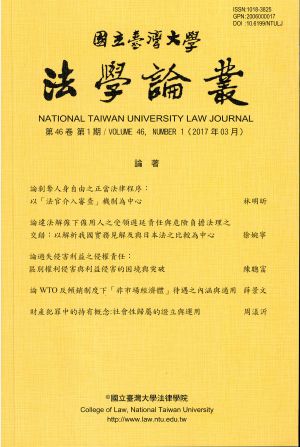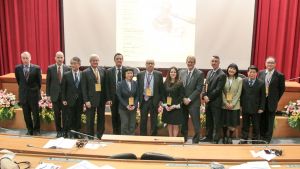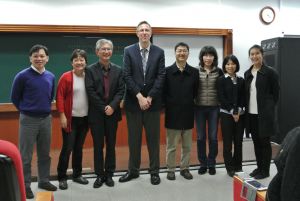eng (601)
Children categories
Summer Program (7)
College of Law Summer Program provides three weeks of intensive and substantial courses about international trade law and practice. Our top-notch instructors along with the high academic quality of our courses even allow you to obtain school credits. It is an excellent opportunity for students to familiarize themselves with theoretical and practical knowledge about international trade law and lawyering.
Additional Info
- Home Institute Warsaw School of Economics
- Visiting Term Fall 2017
-
Course
European Union Economic Law in the International Context
(國際脈絡下之歐盟經濟法)
Additional Info
- Home Institute UC Berkeley
- Visiting Term Fall 2017
- Profile https://www.law.berkeley.edu/our-faculty/faculty-profiles/laurent-mayali/
-
Course
Judicial process and the legal profession in films
(電影中的司法程序與法律專業)
Additional Info
- Home Institute Max Planck Institute for European Legal History
- Visiting Term Fall 2017
- Profile https://www.mpg.de/8985167/europ_rechtsgeschichte_vogenauer
-
Course
Global Commercial Contract Law
(全球商事契約法)
2017/6/14 Anti-Money Laundering and Corporate Governance
Responding to APG (Asia/Pacific Group on Money Laundering) 3rd round assessment on Taiwan in October, 2018, the Anti-Money Laundering Office, Executive Yuan, was established. Afterwards, the Money Laundering Control Act was amended by the Legislative Yuan, and the act, aiming to require more professionals to report to the authorities when any suspicious financial transactions by their clients appear, would go into effect on June 28. In light of the rapid development mentioned above, this seminar, Anti-Money Laundering and Corporate Governance, invited the professionals of the anti-money laundering to share their experience with the audience, and had some deep discussions in the hope of making significant progress in the system of anti-money laundering.
This seminar aimed to help the local professionals grasp the global trend of anti-money laundering in recent years. Therefore, the audiences were limited to professors, lawyers, accountants, and bank-related officers.
The title of the seminar, Anti-Money Laundering and Corporate Governance, showed that we concerned not only about the issue of the financial institution preventing money laundering, but also about the relation between anti-money laundering and corporate governance. The legislator, Chien-Ming, Ker, was invited to be a keynote speaker and tell the audience how important the system of anti-money laundering should be nowadays. The first round of the seminar was mainly about the counter-money laundering cases that had been conducted in Taiwan and other countries. The prosecutor, Pei-Ling, Tsai, and the former manager of Hang Sheng Bank, Bonnie Sok In, Chin were invited to deliver a lecture and share their experience. The second round of the seminar focused on the relation between anti-money laundering and corporate governance. The first topic, “Company Secretary’s Role in AML─Hong Kong Overview”, was delivered by the Chief Executive of Hong Kong ICS, Samantha Suen. After that, the accountant from KPMG, Kuo-Chu, Ma, talked about the corporate governance in the view of anti-money laundering law.
Additional Info
- Home Institute Universität Osnabrück
- Visiting Term Fall 2016
- Profile https://www.jura.uni-osnabrueck.de/lehrende/chinesisches_recht.html
-
Course
Causality in Law
(法律中的因果關係)
National Taiwan University Law Review March 2017 Volume 12, Number 1
National Taiwan University Law Review March 2017 Volume 12, Number 1
Functions of Directors’ and Officers’ (D&O) Liability Insurance and Litigation Risk: An Empirical Legal Study of Taiwan
Author: Chun-Yuan Chen
In this article, Chun-Yuan Chen empirically analyzes the functions of directors’ and officers’ (D&O) liability insurance in corporate governance in Taiwan. He also reexamines the fundamental issue on the litigation risk of directors and officers, and argues and concludes that D&O insurance should not be compulsory and legally capped in Taiwan.
The Role of Governance in Bilateral and National Climate Change Financial Mechanisms
Author: Wen-Chen Shih
In this article, for the design of national Climate Change Financial Mechanisms’ (CCFMs) governance structure, Wen-Chen Shih points out what lessons can be learned from applying these guiding principles, and whether these guiding principles are playing an equally important role in the governance of national CCFMs. Finally yet importantly, Shih clams that many national CCFMs rely partially on bilateral CCFMs. Therefore, in analyzing the role of governance in national CCFMs by shih, governance in bilateral CCFMs will also be examined for its implications on national CCFMs.
Towards Religious Institutionalism? The Future of the Regulation of Religious Institutions in Taiwan
Author: Rung-Guang Lin
In this article, Rung-Guang Lin analyzes a newly emerging approach to the autonomy of religious institutions in Taiwan’s constitutional jurisprudence. In the ROC Constitution, this view is in contrast to an underlying assumption in the Court’s previous jurisprudence on freedom of religion, namely, that the norms and activities of religious groups are presumptively subject to the authority of state law.
The Legal Status of Pre-Contractual Liability: Contrasting Responses from German and English Law
Author: Xiao-Yang Li
In this article, Xiao-Yang Li indicates that in devising the pre-contractual liability, the legislators of China confront a long-running controversy in Chinese Law- the legal status of pre-contractual liability. The comparative study of this thesis builds a picture of the contrasting responses provided by German and English Law to the questions faced by Chinese legislators. This article at the end offers a proposal to the codification of the Chinese Civil Code.
National Taiwan University Law Journal March 2017 Volume 46, Number 1
National Taiwan University Law Journal
March 2017 Volume 46, Number 1
Articles & Abstracts
Ming-Hsin Lin, Professor of Law, College of Law, National Taiwan University.
The Due Process Requirements for the Deprivation of Physical Freedom: Focusing on Judicial Intervention
Albeit Article 8 of the Constitution guarantees the physical freedom of a person, the scope of due process requirements thereof remains a controversial issue in both the academic discussions and legal practices.This paper argues that although the due process requirements provided in Article 8 of the Constitution apply admittedly to criminal defendants, the requirements shall apply to non-criminal defendants by analogy.For a specific institutional design, this paper comments upon that the newly-amended Habeas Corpus Act, and makes suggestions in response to jurisdiction and review process for future reference.
--------------------------------------------------------------------------------------------------------------------------------------------------------------------------
Wan-Ning Hsu, Associate Professor of Law, College of Law, National Chengchi University.
Employer’s Delay in Acceptance or Risk of Loss in Unlawful Dismissal Cases: A Comparative Study on Japan, and the Judicial Decisions of the Civil Code §487 in Taiwan
If an employee has not performed his or her promised work, he or she will not have a claim for remuneration, which is so-called the doctrine of no-work-no-pay. However, the Civil Code §487 is the exception of the doctrine of no-work-no-pay. On the other hand, according to the Civil Code § 267, where “performance of the service is impossible”, the existence of the employee’s right to demand for his remuneration depends on whether the impossibility is “attributable to the employer”. Thus, how to distinguish the employer’s delay to accept the performance tendered to him from the impossibility of the employee's performance is an important issue because it will decide if the employee has the right to claim for remuneration. Through an analysis of the Japan experiences and the reflection on the judicial decisions of the Civil Code §487 in unlawful dismissal cases in Taiwan, this research will focus on the controversial issues, such as when the employer delays accepting the performance and if the employee still has to tender the performance, and try to solve them by the doctrine of risk of loss.
--------------------------------------------------------------------------------------------------------------------------------------------------------------------------
Tsung-Fu Chen, Professor of Law, College of Law, National Taiwan University.
Tortious Liability on Negligent Infringement on Interests: Dilemma From and Breakthrough For the Distiguishment of Infrigement on Rights and Interests
Article 184 of Taiwan Civil Code follows the model of German Civil Code, establishing the tort liability through the distinction between the infringement on rights and the infringement on interests, which has been confirmed by recent Taiwan Supreme Court judgments although it is debatable on this issue from academics in the past. Following this distinction, it raises an important issue about the requirements to impose a tort liability on the tortfeasor when he negligently, rather than intentionally, infringes upon the interests of another. This paper explores the ways in which German law deals with such cases, including the broad interpretation of the “rights” elucidated under article 823 (1) of German Civil Code and the establishment of a theory of the protection for a third party to a contract. This paper suggests that, in addition to expand the scope of the concept of ‘right’ protected by the tort law in appropriate cases, it is desirable to utilize the second sentence of article 184 (1) of Taiwan Civil Code to deal with those controversial cases of negligent infringement on the interests of another.
--------------------------------------------------------------------------------------------------------------------------------------------------------------------------
Ching-Wen Hsueh, Assistant Professor, Department of international Business, National Chengchi University.
The Content and Application of NME Treatment under WTO Agreement
The domestic markets of communist courtiers were controlled by the governments and do not play by the rules of market. Therefore, it is questionable whether the investing authorities still have to take the domestic normal value as the basis for comparison. Thus, in this paper’s section I, the origin of the NME treatment is elaborated and legitimacy and necessity of such treatment is analyzed. Section II tried to discover the criteria of the NME status, which were never clearly provided in the WTO anti-dumping rules, by referring to the relevant provisions, objects and purposes of the anti-dumping rules, and the practices of the members. Section III focused on the methodologies to determine the normal value in NME. By virtue of the findings in the previous sections, the “surrogate mode”, which is the most widely adopted methodology to determine the normal value in NME, is the be reviewed in the last section.
--------------------------------------------------------------------------------------------------------------------------------------------------------------------------
Yang-Yi Chou, Associate Professor of Law, College of Law, National Taiwan University.
The Concept of “Possession” in Criminal Law
The purpose of this article was to clarify the concept of possession in criminal law, which plays a key role in discussing the offences against personal property. The author argued that possession can be defined as the possibility to use things, which is recognized under the social viewpoint. Therefore, possession appears as a social institution. The social viewpoint has the function of orientation, which helps people to decide how they treat objects in daily life. Its legitimacy comes from the voluntary participation of individuals in this institution.
2017/3/9 International Symposium on IP Licensing and Competition Laws
The International Symposium on IP Licensing and Competition Laws hosted by College of Law, National Taiwan University (NTU) took place on March 9 in Taipei, Taiwan inviting experts and scholars from the US, EU, Japan and Taiwan to have rational debates over the regulatory relationship between IP licensing and competition laws, which has been a frequent issue of international contention in recent years. Speakers and panelists who participated in the symposium respectively expressed their unique opinions from different perspectives in economics, law and practical operation. The symposium hence served as a venue for them to find their common grounds on these issues and to propose possible solutions for the relevant domestic authorities' reference to future implementation of policies and application of laws.
University of Maryland Professor Frank Pasquale Serial Lectures
University of Maryland Professor Frank Pasquale Serial Lectures
Date: March 6, 2017
Time: 2:00-4:00 pm
Venue: Tsai Lecture Hall Room 1301
Keynote speaker: Professor Frank Pasquale (The University of Maryland Francis King Carey School of Law)
Moderator: Professor Ming-Yan Shieh (National Taiwan University College of Law)
Professor Frank Pasquale specializes in the area of information law and has achieved excellent research results on information and financial technology law. We are honored to invite Professor Pasquale this time to discuss the increasingly important information privacy issues with the professionals in Taiwan with a view to broaden the horizon of Taiwan’s academic research.
There would be three lectures delivered by Professor Pasquale focusing on the impact of professional service providers from the development of technology which are the subjects “A Rule of Persons, Not Machines” and “Workshop on big data and health privacy issues: The Law and Policy of Predictive Analytics in the Learning Health Care System (and Beyond)” in Institutum Iurisprudentiae, Academia Sinica and the subject “Laws of Robotics: The Future of Professionalism in an Era of Automation” in NTU Law.
Additional Info
- Home Institute Wayne State University
- Visiting Term Spring 2017
- Profile http://law.wayne.edu/profile/dz4321
-
Course
Anglo-American Tort Law
(英美侵權法)
More...
Additional Info
- Home Institute Singapore Management University
- Visiting Term Spring 2017
- Profile https://law.smu.edu.sg/faculty/profile/9568/Christopher-CHEN-Chao-hung
-
Course
Financial Regulations in Asia
(亞洲金融法)
Additional Info
- Home Institute Hofstra University
- Visiting Term Spring 2017
- Profile http://law.hofstra.edu/directory/faculty/fulltime/ku/
-
Course
The United States and International Law
(美國與國際法)
Additional Info
- Home Institute University of Exeter
- Visiting Term Spring 2017
- Profile http://socialsciences.exeter.ac.uk/law/staff/jlee/
-
Course
UK and EU Company Law
(英國及歐洲公司法)
Additional Info
- Home Institute Ruprecht-Karls-Universität Heidelberg
- Visiting Term Spring 2017
- Profile http://www.jura.uni-heidelberg.de/fst/personen/personenkube/kube_e.html
-
Course
Introduction to German Constitutional Law
(德國憲法導論)


